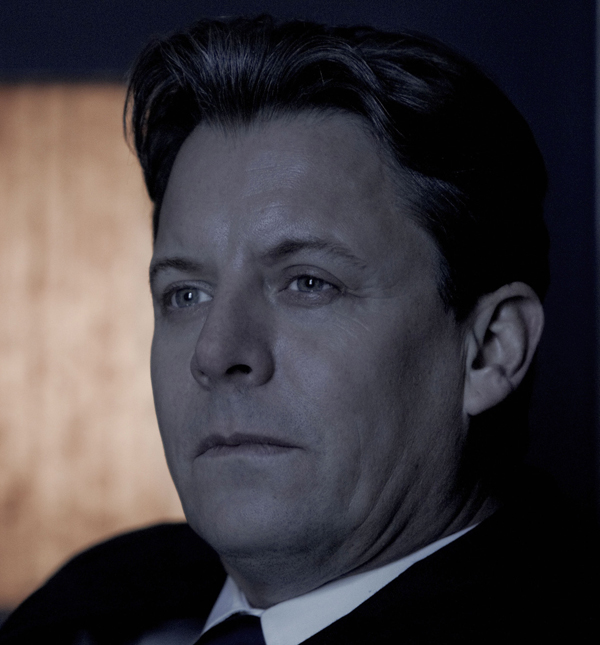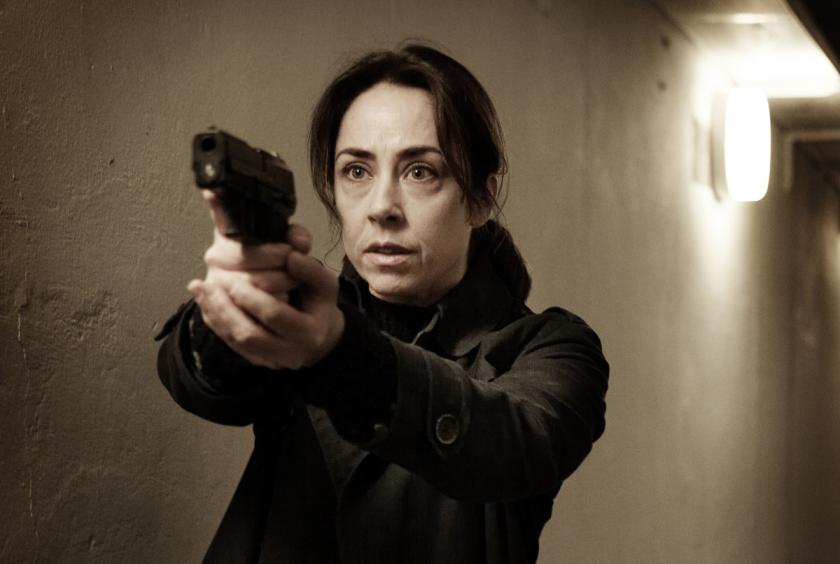I hope it isn't giving too much away for iPlayer catcher-uppers to say that in the end Sarah Lund never did get that undemanding desk job. Instead, the third outing for this ferociously gripping Danish series dragged us screaming and biting our nails right down to the wire, and managed to reach a conclusion simultaneously shocking and saddening yet, in a way, satisfying too.
From the start, the third series has been drenched in the anguish of loss and the pain of separation. The running theme has been the hunt for the kidnapped girl Emilie Zeuthen and the man who took her, but, apart from the distraught and distressed Zeuthen parents, most of the main characters have been carrying their own personal burdens (Anders W Berthelsen as Robert Zeuthen, pictured below).
 Lund (the surely unimprovable Sofie Gråbøl) has been tentatively reaching out towards her estranged son Mark, in the process being forced to confront her failings as a mother which perhaps inevitably come with the job of homicide detective. Prime Minister Kristian Kamper (Olaf Johannessen) has been trying to fight an election campaign while coping with unravelling revelations about his dead son Benjamin, whose supposed suicide haunts him even more than precarious opinion polls. The kidnapper himself is driven by grief for his murdered daughter Louise Hjelby, his own neglect having condemned her to a life in care. In one of creator Søren Sveistrup's moments of bleakest irony, Louise was once used in a campaign to promote foster parenting.
Lund (the surely unimprovable Sofie Gråbøl) has been tentatively reaching out towards her estranged son Mark, in the process being forced to confront her failings as a mother which perhaps inevitably come with the job of homicide detective. Prime Minister Kristian Kamper (Olaf Johannessen) has been trying to fight an election campaign while coping with unravelling revelations about his dead son Benjamin, whose supposed suicide haunts him even more than precarious opinion polls. The kidnapper himself is driven by grief for his murdered daughter Louise Hjelby, his own neglect having condemned her to a life in care. In one of creator Søren Sveistrup's moments of bleakest irony, Louise was once used in a campaign to promote foster parenting.
The final episode had a lot of plates to keep spinning. The election campaign was reaching its climax, with resolution of the Emilie kidnapping seen as critical to the outcome, as Lund and her partner Borch (Nikolaj Lie Kaas) accompanied the kidnapper on an interminable trip to the Norwegian fjords on a promise of finding the missing girl. A sense of fatal dread mounted as they travelled further into the dark Nordic wilderness, the clock ticking down steadily. Meanwhile the police quest for the driver of the black car linked to the Hjelby murder whirred away feverishly in the background, while the possible guilt of Reinhardt, chairman of the Zeeland Children's Trust, advanced and receded frustratingly. And then there was the Lund-Borch relationship, always bubbling under and apt to erupt volcanically at any moment, yet surely an impossible dream.
Especially impressive throughout has been how the layers of the story have interlocked and overlapped without feeling forced or phony. The way the political dimension has been threaded in and out of the the personal and private themes ought to stand as an object lesson to aspiring TV writers, to the extent that you could justifiably describe Killing III as a political drama, as much as a mystery or crime series. Or a love story.
 Johannessen's portrayal of Prime Minister Kamper has been a mini-marvel of its own, as he has tiptoed around the banana skins of treacherous coalition partners and his own ministers secretly conniving with the shadowy Special Branch. The poles of his personality - ruthless political animal and grieving father - were neatly mirrored in his clinically calculating brother Stoffer (Jonatan Spang, pictured above left with Johannessen) and his super-efficient yet emotionally sympathetic adviser, Karen (Trine Pallesen).
Johannessen's portrayal of Prime Minister Kamper has been a mini-marvel of its own, as he has tiptoed around the banana skins of treacherous coalition partners and his own ministers secretly conniving with the shadowy Special Branch. The poles of his personality - ruthless political animal and grieving father - were neatly mirrored in his clinically calculating brother Stoffer (Jonatan Spang, pictured above left with Johannessen) and his super-efficient yet emotionally sympathetic adviser, Karen (Trine Pallesen).
Again, the relationship between government and big business, in the shape of the Zeeland shipping conglomerate, was persuasively depicted as an unsentimental commercial bargain. In a time of plunging recession, Zeeland wanted guaranteed tax breaks if it wasn't going to move its operations overseas. Using Zeeland as a sinister corporate bogeyman became a kind of matador's cloak for the development of the plot. One smart counter-intuitive touch was the way the quest to find missing Emilie brought her estranged parents - her dad was Zeeland's would-be progressive boss Robert Zeuthen (Anders W Berthelsen) - back together, when you'd expect the opposite.
The powers that be at The Killing HQ are telling us that this was the last-ever series. Not to overstate it, that would be a shame. A crime, in fact.















Add comment